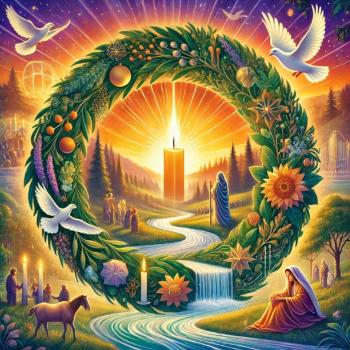The Adventurous Lectionary – The Second Sunday of Advent – December 10, 2023
Psalm 40:1-11
Psalm 85:1-2, 8-13
2 Peter 3:8-15a
Mark 1:1-8
Advent is the season of wakefulness. “Stay awake,” “be woke,” are the mantras of Advent. God’s realm is coming – it is here – and we need to be prepared for a moment of decision, for God or self-interest, transformation or status quo, growth or stagnation, peace or division.
One of my favorite songs from “Godspell” is “Prepare Ye the Way of the Lord.” Since my youth, I have clapped and danced to the tune, and love to hear it in church. Something is happening, a new world is on the horizon. Make haste! A way is being made where there was no way! The Holy One is coming! Perhaps God’s revealing one is already here. God comes to save and heal. Let us clap our hands, open our hearts, jump in the fountain, and go to work to prepare for God’s new age. Of course, our preparation is problematic today, just as it was 2000 years ago: we prepare during difficult times, just as John the Baptist and the prophet Isaiah did. Oppression abounded in John’s and Isaiah’s time; and it still does. Racism was normalized then, it is now; polarization characterized religious and political relationships, the same applies today; leaders had little care for the common people and perpetuated poverty and the gap between the wealthy and poor, and they still do. Bombs fall in Gaza and Israeli children are kidnapped. And, yet we live in hope on a new dawn, a day of justice, of the uplifting of the poor, and the liberation of the captives.
Isaiah 40 describes the theme of preparation, characteristic of the Advent season. Something wild is about to happen, something that will change everything, and the way for God’s coming needs to be prepared, in the highways and byways and in our spiritual pathways. God’s glory is on the horizon – can you see it? – and it is not just for Jerusalem; it is for all creation. Isaiah 40:1-11 plays with a lot of images: comfort and restoration, punishment and amnesty, a reversal of fortunes, global revelation, human mortality and divine immortality, divine strength and divine tenderness, shepherding and power. Beyond destruction and loss is comfort and recovery. The whole earth will proclaim God’s reign of healing and transformation. Love will abound in a glorious new age for Israel and the whole Earth. The offer to share in God’s glory is given to all; wake up, get ready, and join the parade. Celebrate God in the here and now.
The words of Psalm 85 proclaim recovery and renewal. The wayward nation has been pardoned and justice is transformed to healing and unity. A new people is emerging, free and joyful, and in communion with its liberating God. Mourning is over; let’s celebrate!
2 Peter begins with an affirmation of divine and human temporality. God’s timetable is beyond our fathoming. There is no need to create timetables for the end time; each moment is a time of God’s coming. Let’s not worry about the Second Coming; let us open to the Millisecond Coming, the moral and spiritual arc moving through each moment of time. The divine infinity dwarfs our imagination and makes our apocalyptic calculations as foolish as they have been inaccurate for two thousand years. Our days are like grass – we are like mayflies, living a moment, and thinking it to be ninety years – in light of God’s infinite, interstellar, intergalactic journey. How quickly it all passes, and how insignificant it seems in light of our multi-billion, multi-galaxy cosmic adventure. Yet, this is the moment of transformation, forever changing the universe, infinitesimal, yet ever-lasting in impact.
We don’t need to wait for God’s coming: we need to be God’s coming people NOW! Each moment is holy in a God-filled universe. Yet, no moment is final or all-encompassing. Still, we need to be awake for we might miss God’s blessings by being too preoccupied with our own small agendas. In the language of Paul Tillich, this day might usher in the divine Kairos, the in-breaking of divine infinity and dynamism in the course of our moment-by-moment existences. Each moment is miraculous. Each moment is transformative. Be woke to revelation, healing, and inspiration.
The day of God’s Kairos is like a thief in the night. It comes unexpectedly when we are making other plans. It comes as we are Christmas shopping and baking for the holidays, or in a child’s face. It comes on cable news images of war and incivility. It is always in this holy moment, hidden yet ready to spring forth, in surprising wonder, beauty, and demand. The reality of God’s moment by moment coming – the Kairos of this very moment – calls us to be self-aware and mindful and to be people who already live “on earth as it is in heaven.” In this fleeting moment, treasured in God’s everlasting life, we ought to live holy and pure lives, indeed, godly lives.
What might such a holy, godly, and pure life mean? Could it be our one wild and precious earth-life, spoken by poet Mary Oliver? Or the joyful exclamation of the Psalmist, this is the day that God has made, let us rejoice and be glad in it? Certainly, it is not the affirmation of killjoy asceticism, but, a deeper, passionate, fiery asceticism, passionate for God’s pathway of wholeness. to live a holy life is to live wholly, immersed in God’s timely and revelatory presence. It is be whole persons, body, mind, and spirit, living justly and lovingly. Second, to be pure is to live by love, to seek the well-being of all and let self-interest be blurred with God’s vision. To be godly is to seek the god’s eye view of your life and every situation, connecting every moment with God’s dynamic and everlasting, ever-living and ever-changing vision of healing love.
Purity is not just about sex; it is also about money, economic justice, institutional morality, earth-care, and governmental policy. We rightly condemn sexual misconduct and harassment and the evils of persons in power exploiting those who work for them, but we need the same passion in challenging greed-based consumerism, threats of deporting of “dreamers,” America first politics, retreat from environmental concern and climate denial – these too are sins, and they destroy lives!
Mark’s Gospel cuts to the chase. There is no angelic visitation, pregnant mother, perplexed father, Gloria from on high, or magi from the East, simply, the telling of good news by a wild and crazy prophet. Mark’s earthiness precludes such esoteric revelations. Mark, the healing gospel, is down to earth, and loves God in the world of the flesh, hurting, sinful, excluded, and broken flesh. John the Baptist tells us to get on the road. He reveals our spiritual GPS and tells us to set our feet in the direction of God’s new age. John challenges us to get rid of excess baggage, focus on what’s essential, and get moving on the road God is preparing for us. (For more on healing in Mark’s Gospel, see my “Healing Marks: Healing and Spirituality in Mark’s Gospel.)
In the few weeks remaining till the annual celebration of Jesus’ birth, there is much to do to prepare for the holidays at home and church. Yet, these few weeks participates in God’s everlasting journey. The Christmas spirit is more than buying gifts; it is a transformed mind, changed heart, and caring hands. It is becoming Christ-like as we await the advent of something amazing out on the horizon. The ways need to be made straight as we travel through Gaza and Tel Aviv, the borderlands, Wall Street, undocumented workers’ homes, the halls of national power, and board rooms where calloused decisions make the difference between life and death.. The pathways need to be made straight – but not preventative of holy meandering – in our churches and our lives so that we might be holy, pure, godly, and a little bit wild and crazy – like John the Baptist – as we walk the road of repentance, changed lives and minds with Christ as our companion. (For more on lectionary readings from Mark, see Bruce Epperly “Mark’s Holy Adventure: Preaching Mark’s Gospel for Year B.”)
+++
Bruce Epperly is a theologian, professor, spiritual guide, seminary administrator, and author of over eighty books, including his five-volume series on the “twelve days of Christmas” – the “twelve days of Christmas with Howard Thurman…Francis and Clare of Assisi…Madeleine L’Engle…Carols and Hymns…Celtic Spirituality,” as well as his book on the Incarnation, “From Cosmos to Cradle.” Other texts include “The Elephant is Running: Process and Open and Relational Theology and Process Theology” and “Process Theology: Embracing Adventure with God.” He can be reached at [email protected].











